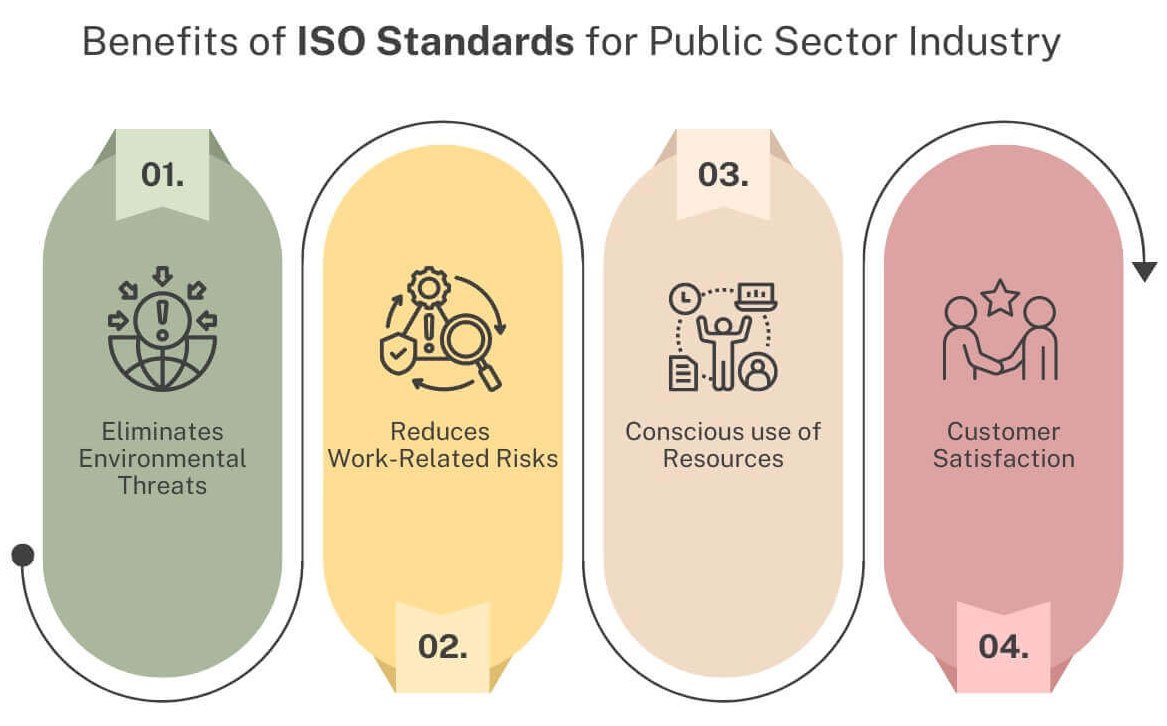The public sector is the segment of the economy under government control and management. It consists of organizations that provide public goods and services, such as national defense, law enforcement, public education, health care, social welfare, and infrastructure development. Its mission is to serve the general public with needed goods and services while also ensuring society’s overall well-being. The public sector is in charge of protecting the country from external threats while also maintaining domestic security through military and law enforcement entities. Public sector must implement these standards to ensure the smooth flow of their tasks.
MSCi is an ISO certification consultancy body that assists public sectors industries in maintaining the highest quality standards to ensure customer satisfaction. Furthermore, we assist firms in meeting the requirements of numerous ISO standards relevant to the public sector industry.
ISO certification is the process of analyzing and validating a company’s compliance with specific ISO standards. Certification bodies conduct audits to evaluate whether an organization’s management system meets the requirements of a specific ISO standard, such as ISO 9001 for quality management or ISO 14001 for environment management.
ISO Certifications provide an organized and systematic growth strategy for a wide range of industries, including construction. ISO certificates offer a planned and systematic growth model for businesses, notably those in the construction industry.
To achieve ISO certification, you must show that your company meets the standard’s requirements. Although this may sound intimidating, many of the requirements are standard good business practice, and we will help you every step of the way.
Strong quality management system are more important than ever as the public sector deals with increasing demands and difficult problems. As dependable allies, ISO consultants are able to successfully negotiate the complex environment and assist governmental bodies and public institutions in achieving operational excellence.
These professionals offer a wealth of information that has the potential to revolutionize the public sector because of their in-depth knowledge of ISO standards and their real-world applications. The experience of ISO consultants may help public institutions reach their full potential by guaranteeing compliance, promoting continuous development, and streamlining procedures and increasing efficiency.
Leaders in the public sector cannot afford to ignore the strategic benefit of investing in the knowledge of ISO consultants. These individuals possess a strong dedication to quality and adeptness in navigating the distinct dynamics of government organizations. As such, they are well-positioned to act as catalysts for good change, propelling the public sector towards enhanced efficiency, compliance, and public trust in the future.
The following are the benefits of ISO standards for Public Sector Industries. These are:

Eliminates Environmental Threats: The International Organization for Standardization (ISO) has published hundreds of standards to cater to various needs of management systems. ISO 14001 standard helps public sector industries conduct an environmental audit to check the effectiveness of business operations and impacts on society and nature.
Reduces Work-Related Risks: ISO 45001:2018 Certification for Occupational Health and Safety Management System (OHSMS) helps public sector industries to conduct HAZARD IDENTIFICATION & RISK ASSESSMENT (HIRA) assessment. It allows industries to identify potential work-related risks and hazards.
Conscious use of Resources: ISO Certification helps public sector industries define their organizational needs to allocate resources more consciously. Moreover, it ensures optimum resource utilization by ensuring minimal errors and wastage of available resources.
Customer Satisfaction: The customer is God, and every organization in the market works to make customers happy by meeting their needs and requirements. Moreover, ISO 9001 for Quality Management System (QMS) can help public sector industries to demonstrate their commitment to providing quality goods and services.
The Public Sector Industry is the backbone of an economy as it ensures the equitable allocation of resources in the nation. Moreover, a public sector industry can apply for the following ISO Certification:
MSCi is a renowned ISO consultancy body that offers personalized guidance tailored to an organization’s unique needs, significantly streamlining the certification process. A consultancy with a strong reputation for quality and reliability, backed by client testimonials and industry endorsements, ensures confidence in achieving and maintaining ISO standards. MSCi provides cost-effective services and ongoing support to train employees to ensure the organization attains certification while sustaining continuous improvement.
With the help of our ISO consulting services, you can comprehend standard requirements, apply them to management systems, and keep the necessary records and paperwork. Prior to organizing the implementation of any management system in your company, you must become familiar with its fundamentals. The ISO 9001 standard, for instance, assists your company in setting up and putting into place quality management system. It guarantees that adequate quality controls are in place throughout the whole production or distribution process of goods or services.
The public sector plays a vital role in economic growth by investing in infrastructure, providing basic services, and encouraging fair competition and legislation. It also contributes to lowering inequality and increasing societal well-being. With the help of our ISO consulting services, public sector industries can comprehend standard requirements, apply them to management systems, and keep the necessary records and paperwork. Prior to organizing the implementation of any management system in your company, you must become familiar with its fundamentals. The ISO 9001 standard, for instance, assists your company in setting up and putting into place quality management systems. It guarantees that adequate quality controls are in place throughout the whole production or distribution process of goods or services.
Ever since its establishment of QMCS in 1991 in Gurgaon, MSCi (Management System Compliance Incorporation) came into existence with broader portfolio focusing on aggressive growth to enter international market. It has become one of the largest & fastest growing business management consulting organization which specializes in business consulting services to organizations of any size or sector
ISO Consultancy Services
33, Guru Nanak complex, New Railway road, Gurgaon-122001, haryana, India
